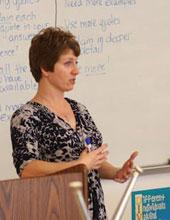
View the report and related materials
WASHINGTON, DC ─ High performing education systems around the world provide valuable lessons for the United States as policy makers and educators seek to develop systems to improve teacher and school leader effectiveness in this country, a new report from the Alliance for Excellent Education and the Stanford Center for Opportunity Policy in Education (SCOPE) concludes.
The report comes in advance of the International Summit on the Teaching Profession hosted by the U.S. Department of Education that is designed to engage countries around the globe in an intensive discussion about promising practices for recruiting, preparing, developing, supporting, retaining, evaluating, and compensating world-class teachers.
“Teacher and Leader Effectiveness in High-Performing Education Systems,” edited by Linda Darling-Hammond, Stanford professor and co-director of SCOPE, and Robert Rothman, a senior fellow at the Alliance, examines highly effective systems to develop and support teachers and leaders in Finland, Ontario, and Singapore.
These jurisdictions were chosen because they have attained among the highest and most equitable performance in the world on international assessments and because they attribute their success to their efforts to recruit, prepare, develop, and retain highly effective educators. They are comparable in population to mid-sized U.S. states.
“Nations that take student learning seriously do not leave teacher quality to chance,” observed Darling-Hammond. “They ensure that all teachers get access to the knowledge and skills they need to be successful, and they support their improvement throughout the career.”
“Teacher effectiveness is one of the most important factors in student learning, and we want to be sure we have the best people in classrooms, prepare them well, and keep them there,” said Bob Wise, president of the Alliance for Excellent Education and former governor of West Virginia. “These systems have a lot to teach us about how to do those things, and they get results.”
The report outlines five lessons learned about these jurisdictions’ systems. They are:
- It takes a system.
- Get it right from the start.
- Make teaching an attractive profession.
- Invest in continuous learning.
- Proactively recruit and develop high-quality leadership.
The policies of these nations are not expected to be imported wholesale into the United States, the report notes. Rather, these policies can expand U.S. policy makers’ views of what is possible. The examples also show how these policies can be implemented in different contexts.
In addition to an overview chapter that summarizes these lessons and shows how each system carries them out, the report also includes detailed descriptions of the systems for teacher and leader effectiveness in Finland, Ontario, and Singapore that were written by leading researchers in each of the jurisdictions.
#####
The Alliance for Excellent Education is a Washington, DC-based national policy and advocacy organization that works to improve national and federal policy so that all students can achieve at high academic levels and graduate from high school ready for success in college, work, and citizenship in the twenty-first century. For more information about the Alliance for Excellent Education, please visit http://www.all4ed.org.
The Stanford Center for Opportunity Policy in Education fosters research, policy and practice to advance high quality, high equity education systems locally, nationally and internationally.

